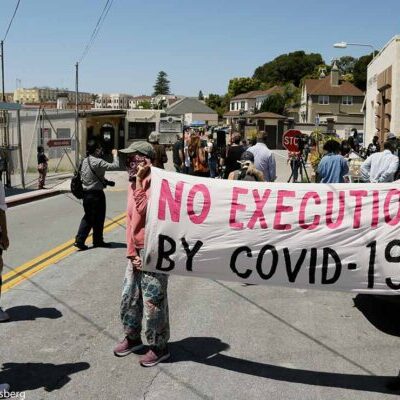Oklahoma County Jail is just at the beginning of its COVID crisis. But it’s in an ongoing carceral crisis as well. We can’t talk about one without the other.
Oklahoma County Jail is just at the beginning of its COVID crisis. But it’s in an ongoing carceral crisis as well. We can’t talk about one without the other.
Yesterday morning, many woke to the news that Oklahoma County Jail now has more than 149 people with COVID-19, a little over a week after Clarence Merrell, who was 64 and was COVID vulnerable, died as a result of COVID in the jail’s custody. Oklahoma County Jail, like many carceral facilities around the state, has been a public health nightmare uniquely vulnerable to COVID outbreak, waiting for the worst without actionable response for months.
What’s the answer? The Oklahoma County Budget Board threw more money at the problem, voting earlier this week to send more than $36 million of CARES Act Relief funding into a structure and a system that continue to perpetuate harm, rather than allocating it to providing relief for people who need it most.
You see, the Oklahoma County Jail is not just having a COVID problem, it’s outbreak is part of a broader public health crisis that results from Oklahoma’s broken pre-trial system. On any given day, in county jails across the country, an average of 70% of the people being held are there pre-trial. In Oklahoma, it is usually at least 80% of the hundreds of people in the jail. This is a constitutional crisis on any given day. Money bail is supposed to be a mechanism used, along with other tools, to secure reappearance in court. When it is assessed, it should be determined that is a mechanism required to assure reappearance, and an individualized assessment of the accused person’s ability to pay should be made to determine what amount they can reasonably give the court in order to ensure their return. Instead, amounts are largely arbitrary and tied more to charge than they ever are to any individual person. What that creates is a money bail system that is de facto pre-trial detention for anyone who is not wealthy. What that means during the middle of a pandemic, is that people unable to buy their freedom are now subject not only to the horrors of the Oklahoma County Jail’s inadequate care, they’re especially vulnerable to a potentially deadly virus that has unknown long-term consequences.
So, shouldn’t funding help? Does the Oklahoma County Jail trust need $36 million? Maybe to continue business as usual, but business as usual has never been adequate. Paying to mitigate a virus outbreak among a particularly vulnerable population, when many of those folks should not be in the jail, is negligible. Money to fix the structural issues could be realized simply from shifting the pre-trial system towards constitutional standards. And while we hope for all of Oklahoma that bail reform comes through policy change soon, it could be done now simply by system actors, especially prosecutors and judges and the sheriff, taking steps within their discretion to increase the number of people released on their own recognizance, and drastically reducing the number of people who must remain in the jail.
We’ve run the alarm on the harms of COVID outbreaks in Oklahoma prisons and jails again and again and again. Not because we want to, but because one of the most urgent constitutional crises facing our state in the middle of a pandemic is the fact that those in power are still more eager to double down on tough on crime policy at the expense of public health and safety than they are to recognize the humanity of the people in custody whose lives are at risk simply because of their carceral status. Oklahoma County Jail, and carceral facilities across the state, such as Lexington, Mabel Bassett, Davis, Cimarron, and Joseph Harp where we’re seeing increasingly large numbers of positive cases and people in quarantine, will see unnecessary outbreaks. Those will quickly escalate in communities where staff members live.
Oklahoma’s COVID-19 crisis is about to become much worse because of our mass incarceration crisis. It is a truth that cannot be ignored, one that cannot be spent away by throwing further tax dollars down the drain.
We hope elected officials at every level, at any level, will be bold enough to act, to take meaningful steps at release in order to save lives. Our public safety depends on it.


